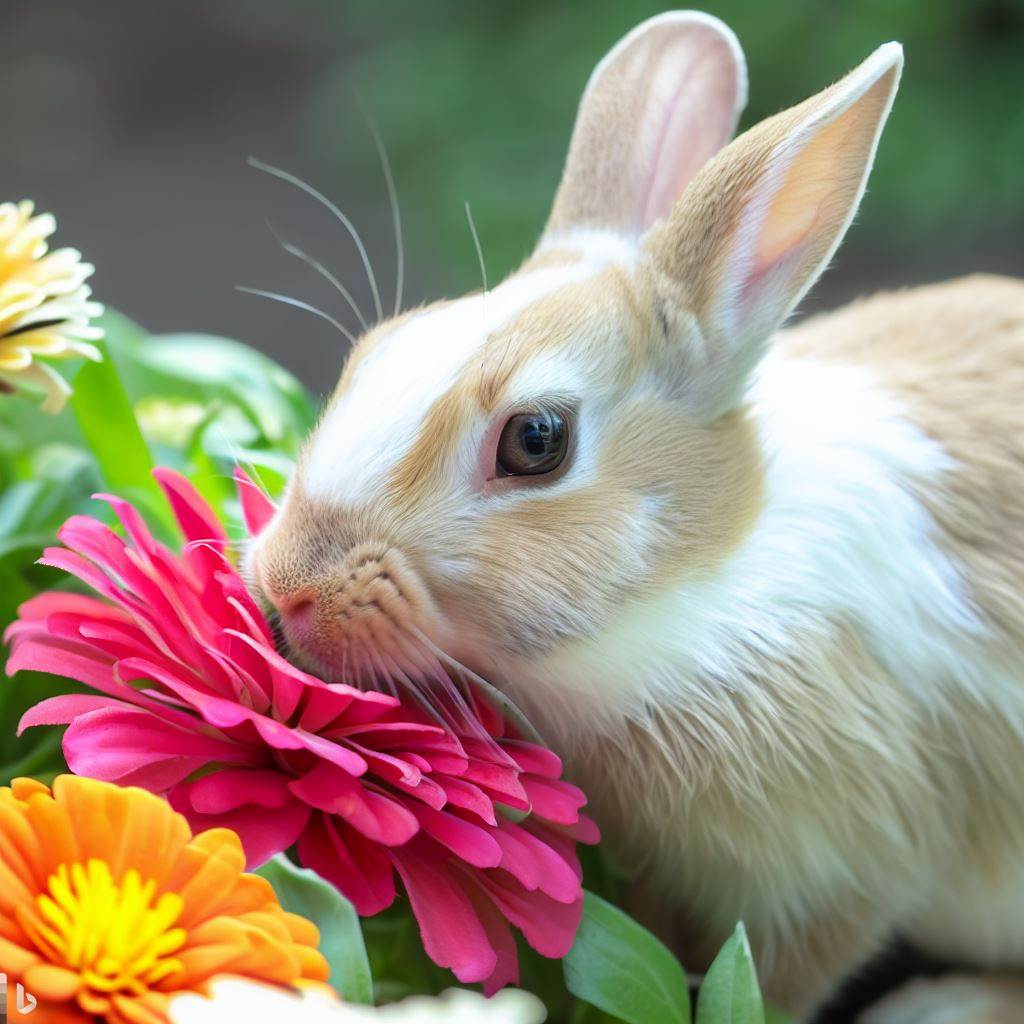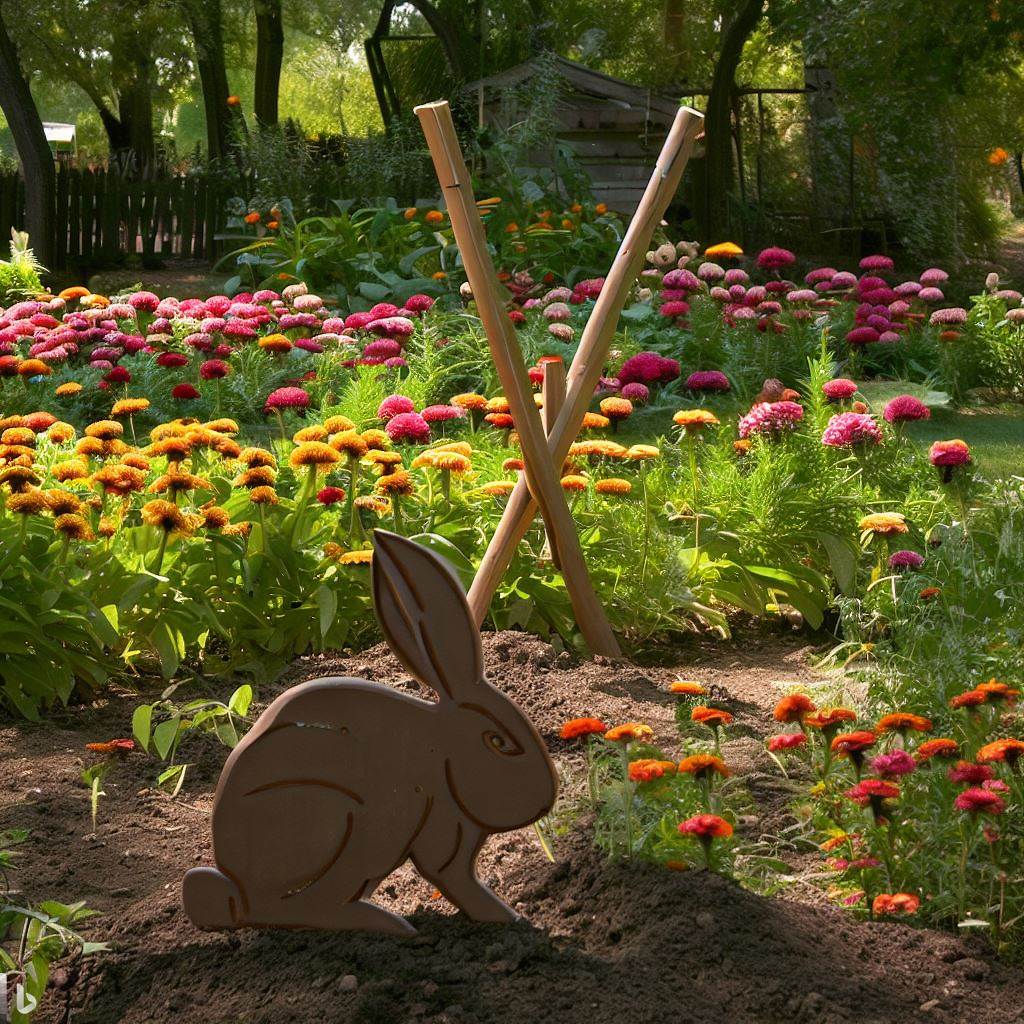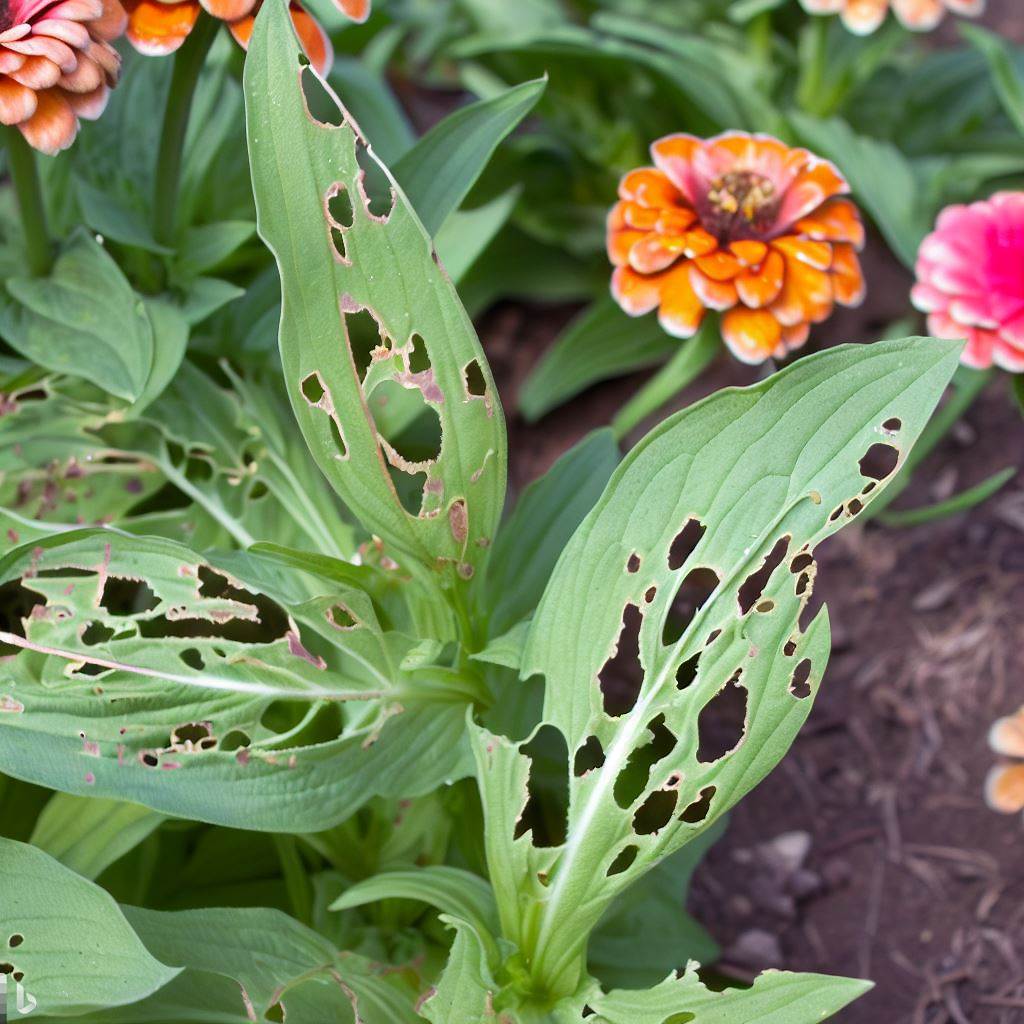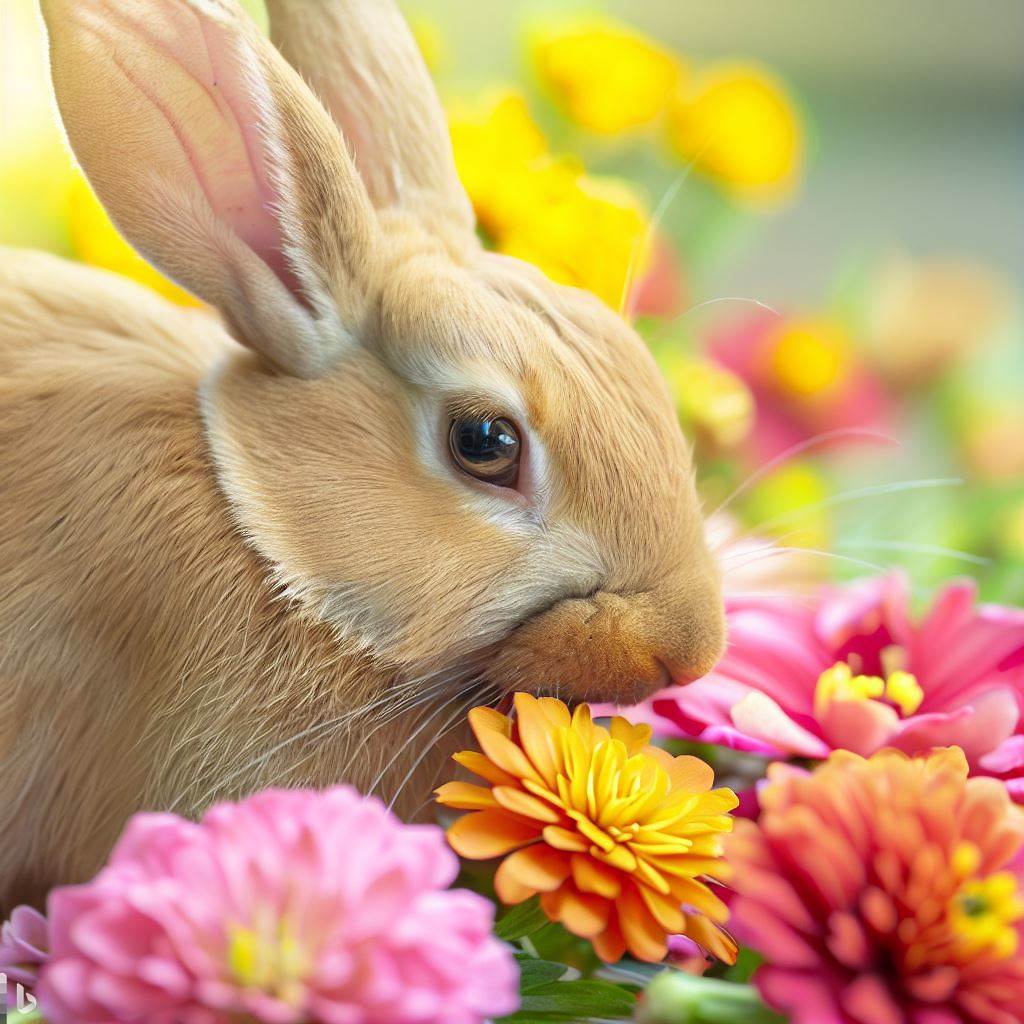Discover Will Rabbits Eat Zinnias? Learn about rabbit preferences and how to protect your garden blooms. Find out more here.
Introduction
This article will explore the fascinating rabbit world and its relation to the zinnias. Rabbits are adorable animals often found in gardens, and zinnias are beautiful, colourful flowers that gardeners love. When the two elements come together and interact, it could create challenges for gardeners. We hope to offer valuable knowledge and practical suggestions to assist you in understanding the interactions between zinnias and rabbits and the best way to safeguard your garden while preserving the natural habitat for these furry friends.

Will Rabbits Eat Zinnias?
Are rabbits a hankering for Zinnias? This is a question that gardeners have thought over. These fluffy little creatures could be their gardeners, but do they like munching on Zinnias?
The unfortunate reality for gardeners who adore Zinnias is yes. Rabbits are known for nibbling on these bright and vibrant blooms occasionally. Zinnias aren’t their preferred food, but when there is a shortage of food, or if they stumble across your zinnia garden, they may have a bite.
It’s important to be aware that rabbits have a variety of preferences and may change based on what is available in other food sources. If they can find more appealing alternatives like clover or younger shoots, they may skip Zinnias. But, in times of shortage, they could be more lenient.
To prevent your zinnias from becoming a rabbit’s poop, Consider using safeguards like the fencing of your garden or repellents. Simple fencing around your garden will greatly help keep these cute hunter-gatherers from your garden. Also, commercial or natural repellents for rabbits can stop them from getting close to your zinnias.

The Enigmatic World of Zinnias
Before getting into the rabbit-zinnia link, we should familiarize ourselves with the zinnias. Zinnias, scientifically called Zinnia elegans, are perennial flowers that belong to the sunflower family Asteraceae. The beautiful flowers originate from Mexico; however, they are planted in gardens worldwide due to their breathtaking beauty.
Zinnias come in many sizes, shapes, and shades, making them a sought-after choice among gardeners. From the tiny “Thumbelina” up to the more imposing “Benary’s Giant,” there’s an assortment of zinnias to meet the preferences of every gardener. With vibrant hues ranging from yellows and reds to soft purples and pinks, zinnias delight the eyes.

Strategies to Guard You and Your Zinnias for Rabbits
To guard your zinnias against rabbits, think about implementing several strategies. Begin by constructing a barrier in your zinnia plant, including fencing or chicken wire. In addition, you can apply natural repellents such as garlic or pepper spray with cayenne to repel rabbits. Check your garden regularly for signs of activity by rabbits, and eliminate any entry points or burrows immediately. Also, ensure you have alternative shelter and food sources to keep rabbits away from your zinnias.
With these strategies to your advantage, you can enjoy stunning zinnias and keep the niggling rabbits out of your garden.
Step-by-Step Guide
Fencing
Start by putting up an enclosure around your zinnia plant. A fence about 2 feet in height constructed of chicken wire or a piece of hardware cloth is generally enough. Make sure it is at least a few inches below the ground level to avoid digging.
Repellents
Put natural rabbit repellents to and around your Zinnias, like garlic or cayenne pepper spray. Apply after rain or as often as you need to.
Regular Inspection
Check your garden regularly for signs of activity by rabbits, including snipped leaves or droppings. Find any entry or burrow points and act by filling holes in or using wire mesh.
Alternative Food Sources
Plant nearby rabbit-resistant plants such as marigolds or lavender to deter rabbits from your flowering zinnias. Giving them alternatives to their food will deter them from eating your blooms.
Scare Tactics
Use scare tactics such as motion-activated lighting or a radio that is playing within the yard. These unanticipated stimulations can cause rabbits to be uncomfortable and discourage them from doing so.
Netting
Consider using bird netting and row cover covers in order to secure your Zinnias. Ensure the bird netting is securely anchored to prevent rabbits from sliding through.
Companion Planting
Plant zinnias in conjunction with rabbit-resistant plants like rosemary and thyme. This could help disguise the smell of Zinnias, making them less attractive to rabbits.
Traps and Removal
If the rabbit issue persists, you can set traps that are humane and relocate the rabbits captured to a better location. Be sure to check local regulations before doing this.
Maintenance
Regularly maintain your garden by trimming the tall grass and weeds since they could provide areas for rabbits to hide. Keep your garden neat and tidy.
Consult Experts
Ask local gardening or wildlife experts for customized solutions if nothing else works.
If you follow these steps and ensure you are taking a proactive approach, it is possible to effectively guard your zinnias from predators and enjoy a lush free of rabbits in your garden.

Signs of Rabbit Damage for Zinnias
If you’re experiencing damage to your zinnia plant and think rabbits cause it, there are a few warning signs to look for. Rabbits are famous for their affection for tender vegetation, and unfortunately, Zinnias fit into this category.
Here are some signs that your zinnias could be suffering from damage caused by rabbits.
Chewed Leaves
The most noticeable indicator of damage from rabbits to Zinnias is the chewed edges of leaves. Rabbits are known for nipping at their edges and creating a serrated or ragged look. They can also eat entire leaves or chew off some leaves on young plants.
Stem Nibbling
Rabbits may also be able to target stems of the zinnia plant. Be aware of stems that have been chewed or eaten in part and can harm the plant and impact the overall health of the plant.
Browsing Damage
Rabbits are known to eat the zinnias they pass throughout your backyard. This could cause irregular or uneven damaged patterns. This can be due to certain species of zinnias being more damaged than others.
Excrement
Another indicator of the presence of rabbits is the droppings they leave behind. Rabbit faeces look like tiny, round pellets that can be found on damaged plants. If you find the droppings in your zinnias, this indicates that rabbits are responsible for the culprits.
Bite Marks
Check the zinnia flower itself. Rabbits can have a bite from the vibrant petals, leaving distinct bite marks. This can diminish the aesthetic appeal of the plant.
Tunnels and Burrows
Although it isn’t directly connected to zinnia problems, rabbit tunnels and caves in your yard could signal an increase in the number of rabbits living within the vicinity. A solution to this issue will help avoid future damage to your plant life, including zinnias.
To guard your zinnias against damage from rabbits, you should consider physical barriers like fencing or netting, applying repellents, or planting rabbit-proof flowers along with your Zinnias. These steps can help protect the beauty and health of your zinnias and keep those nagging rabbits out of your garden.

The Role of Zinnias in Rabbit Diets
Zinnias are known for their vibrant and vivid flowers, which may not be the primary flower you think of when considering rabbit diets. However, these gorgeous flowers play an important role in helping meet our furry companions’ nutritional requirements. While zinnias are not the main source of nutrition in the lives of rabbits, they could be used as a treat or a supplement to their daily diet. Zinnias contain a lot of fibre, which helps digestion and avoids digestive issues in rabbits. In addition, the edible petals of their flowers provide the taste of variety, which can increase an animal’s appetite and improve their overall health.
Despite the potential benefits, it’s important to be careful when introducing zinnias to a rabbit’s diet. A few species of zinnia are safe to eat, and some could contain harmful substances that could cause harm to rabbits. To protect your pet, you should only provide zinnias marked as safe for pets and not treated with pesticides, chemicals, or other substances. In addition, moderation is crucial. Feeding too many zinnias for your rabbit could cause digestive issues for their delicate system, leading to health problems. Always consult a vet or a rabbit nutrition specialist to determine the right amount of zinnias in your rabbit’s diet and to ensure that they get the right nutrition and balance in their food program.

Do rabbits like zinnia plants?
Rabbits do not generally prefer the zinnia plant because they aren’t a popular diet for rabbits. Zinnias contain a bitter taste and are not likely to be the first food option.
How do I prevent my rabbit from consuming my Zinnias?
To safeguard your zinnia plants from damage caused by rabbits, you should consider fences or mesh in your garden beds. It is also possible to plant rabbit-proof plants around the garden to discourage the rabbits. Natural repellents such as cinnamon or cayenne on the soil will also deter rabbits from gnawing on your flowers like zinnias.
What kind of flowers do rabbits like to eat?
Rabbits can enjoy a range of blooms, including pansies, petunias, roses, and nasturtiums. It is important to ensure that the flowers haven’t used pesticides or chemical substances because they can cause harm to rabbits.
Can my bunny take marigolds for a meal?
Marigolds are generally considered to be safe for rabbits to consume in moderate amounts. They are a vibrant ingredient to add to your rabbit’s diet. However, it is important to introduce new foods slowly and keep an eye on your rabbit for any negative reactions.
Do squirrels eat zinnias?
Squirrels aren’t typically thought to eat zinnias. They’re more likely to hunt for seeds, nuts, and other fruits. If you do have an issue with squirrels in your yard, there is a chance that they will consume zinnia leaf litter. However, it’s not a frequent occurrence.
Conclusion
Rabbits have been known to take a bite of Zinnias. Zinnias aren’t usually their preferred food choice since they prefer soft greens and other vegetables. If they’re hungry and other food sources are available, they might eat on zinnias. To safeguard your zinnias against the damage caused by rabbits, it is recommended to employ fencing repellents and other methods to keep these animal-friendly intruders out of your yard. Even though zinnias may not be their favourite food source, It is better to implement preventive measures to protect the health and longevity of your zinnia flower.
